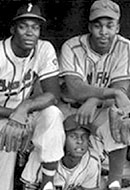Jews and Black Baseball

Prague has its Altneuschul and Rabbi Judah Loewe, who created the original Golem; Worms has its Raschi-Haus, where the great medieval scholar is said to have studied. And in America, St. Paul, Minnesota has its Temple of Aaron. It was this Conservative synagogue, legend has it, where Sandy Koufax attended Yom Kippur services instead of pitching for the Los Angeles Dodgers in the first game of the 1965 World Series. (For the record, Jane Leavy says in her biography of Koufax that he sat out the game in his hotel room.)
But apart from Koufax, Hank Greenberg, and a handful of others—more or less including Ralph Branca, who threw the pitch that Bobby Thomson hit to give the New York (baseball) Giants the 1951 National League pennant, and Ryan Braun, this year's National League MVP—the sports where Jewish athletes left their marks were boxing and basketball. The most famous Jew in sports of the 20th century might well be not an athlete but a broadcaster: Howard Cosell, who can lay some claim to being the man who made football the most popular game in the country.
But baseball, though no longer America's undisputed "national pastime," is still the sport whose thread winds most steadily through the larger picture of American history. One of the most important ways in which baseball is woven into the country's historical fabric is through the progress of African-Americans in the game; that story, in turn, was significantly affected by the role that Jews played in the baseball enterprise. This intersection between African-Americans and Jews is the subject of Rebecca T. Alpert's Out of Left Field: Jews and Black Baseball.
The Jews in Alpert's book are not the Jewish people as a whole, but half a dozen Jewish men. Three of them—Ed Gottlieb, Syd Pollock, and Abe Saperstein—were owners and promoters in baseball's old Negro leagues. The other three—reporters Lester Rodney, Nat Low, and Bill Mardo—helped destroy those same Negro leagues by campaigning to open baseball's white major leagues to black players. Yet is it not unfair to treat these individual Jews as stand-ins for the larger group. Alpert both tells their individual stories and fills in the larger canvas.
It is a complicated story. The first three Jews in Alpert's book were entrepreneurial capitalists, and they were not black. Thus, they were tainted, suspected by some of exploitation. In 1921, a man named Nat Strong—a non-Jew, in point of fact—was vilified in the black press as the "Hebrew Menace to colored baseball." Pollock owned, and Saperstein promoted, a team named the "Ethiopian Clowns"; baseball clowning has always been the province of Jews and blacks. (The current "clown prince of baseball" calls himself "Myron Noodleman.")
Other black-Jewish connections have also persisted. A Saperstein team in another sport, the Harlem Globetrotters, is still going strong. The recent New York Times story about the long-sought agreement between the National Basketball Association's players and owners was accompanied by a photo of four men—two blacks from the players' side, two Jews for the owners.
As for the Negro leagues' demise, we all know the story of Branch Rickey's signing Jackie Robinson to play for the Montreal Royals, setting him on a path to become the first non-Latin black player in major league baseball since the 19th century. It was a historic moment that played a real part in the changes culminating in the 1964 Civil Rights Act. But, like most world-changing events, it did not spring from a historical vacuum. One man who paved the way for it was Nat Low, a sportswriter for the Daily Worker. As a result of prodding from people like Low, Kenesaw Mountain Landis, then Commissioner of Baseball, announced that individual team owners were free to decide whether or not to sign black players. Low then persuaded William Benswanger—the owner of the Pittsburgh Pirates and the only Jewish team owner in the majors at the time—to agree to try out some Negro players. Emory Jackson, a columnist for the black Atlanta Daily World, hailed the agreement as "an American move to make an American sport truly American."
But this story, too, was complicated. For various reasons, the Pirates tryout never took place. More generally, the Daily Worker's role in the push for black players became a problem. As the 1940's became the 1950's, the newspaper's Communist politics made it radioactive as an ally in any public campaign. More than that, the feeling grew in the black community that, as one letter-writer to the Atlanta Daily World put it, "NEGROES THEMSELVES" should be leading the fight.
In later years, Robinson was often praised as a "credit to his race"; most often it was probably intended as a compliment, but it was an extremely patronizing one. Hank Greenberg's experience in baseball was not as harsh as Jackie Robinson's, but it was similar enough so that Greenberg felt a great deal of sympathy with him. Greenberg did not call Robinson a "credit to his race." Instead, he wrote to Robinson, "In my opinion you have been a credit to baseball and an inspiration to thousands of other youngsters, who will attempt to emulate your example." In a new biography of Greenberg, in the Yale University Press "Jewish Lives" series, Mark Kurlansky characterizes this letter as stemming from Greenberg's ideal of disregard for "race, creed, and color"—which, unfortunately, sounds so dated today. As the decades pass, arguments about the social and political aspects of baseball loom large in the media and change with the fashions. But the game on the field will always outlast them.
Michael Carasik is a fan of the Chicago White Sox, a team with a Jewish owner and a black general manager.
Comments are closed for this article.




